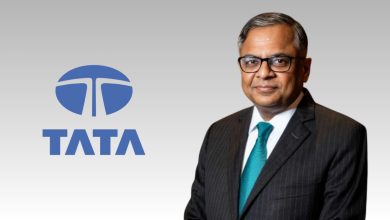Rishi Sunak Biography – A Favorite Indian to Succeed the PM of UK
Rishi Sunak is a British politician who served as Chancellor of the Exchequer from 2020 to 2022, having previously served as Chief Secretary to the Treasury from 2019 to 2020. A member of the Conservative Party, he has been Member of Parliament for Richmond since 2015.
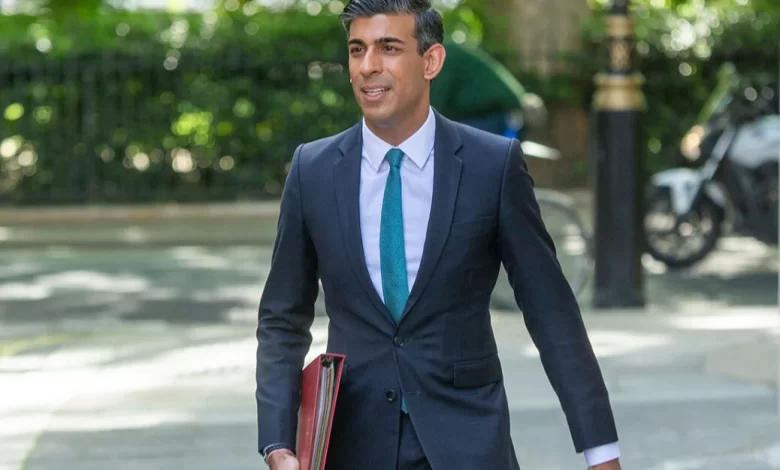
| Quick Info→ | |
|---|---|
| Real Name: | Rishi Sunak |
| Profession: | British politician |
| Birthplace: | Southampton, Hampshire, England |
| Spouse: | Akshata Murty |
| Age: | 42 |
Rishi Sunak (born 12 May 1980) is a British politician who served as Chancellor of the Exchequer from 2020 to 2022, having previously served as Chief Secretary to the Treasury from 2019 to 2020. A member of the Conservative Party, he has been a Member of Parliament (MP) for Richmond (Yorks) since 2015.
Born in Southampton to Indian parents who had emigrated from East Africa, Sunak was educated at Winchester College. He subsequently read philosophy, politics, and economics at Lincoln College, Oxford, and later gained an MBA from Stanford University as a Fulbright Scholar. While studying at Stanford, he met his future wife Akshata Murty, the daughter of N. R. Narayana Murthy, the Indian billionaire businessman who founded Infosys. After graduating, he worked for Goldman Sachs and later as a partner at the hedge fund firms The Children’s Investment Fund Management and Theleme Partners.
Elected for Richmond (Yorks) at the 2015 general election, he served in Theresa May’s second government as Parliamentary Under-Secretary of State for Local Government. He voted three times in favor of May’s Brexit withdrawal agreement. After May resigned, Sunak was a supporter of Boris Johnson’s campaign to become Conservative leader. After Johnson was elected and appointed Prime Minister, he appointed Sunak as Chief Secretary to the Treasury. Sunak replaced Sajid Javid as Chancellor of the Exchequer after his resignation in February 2020.
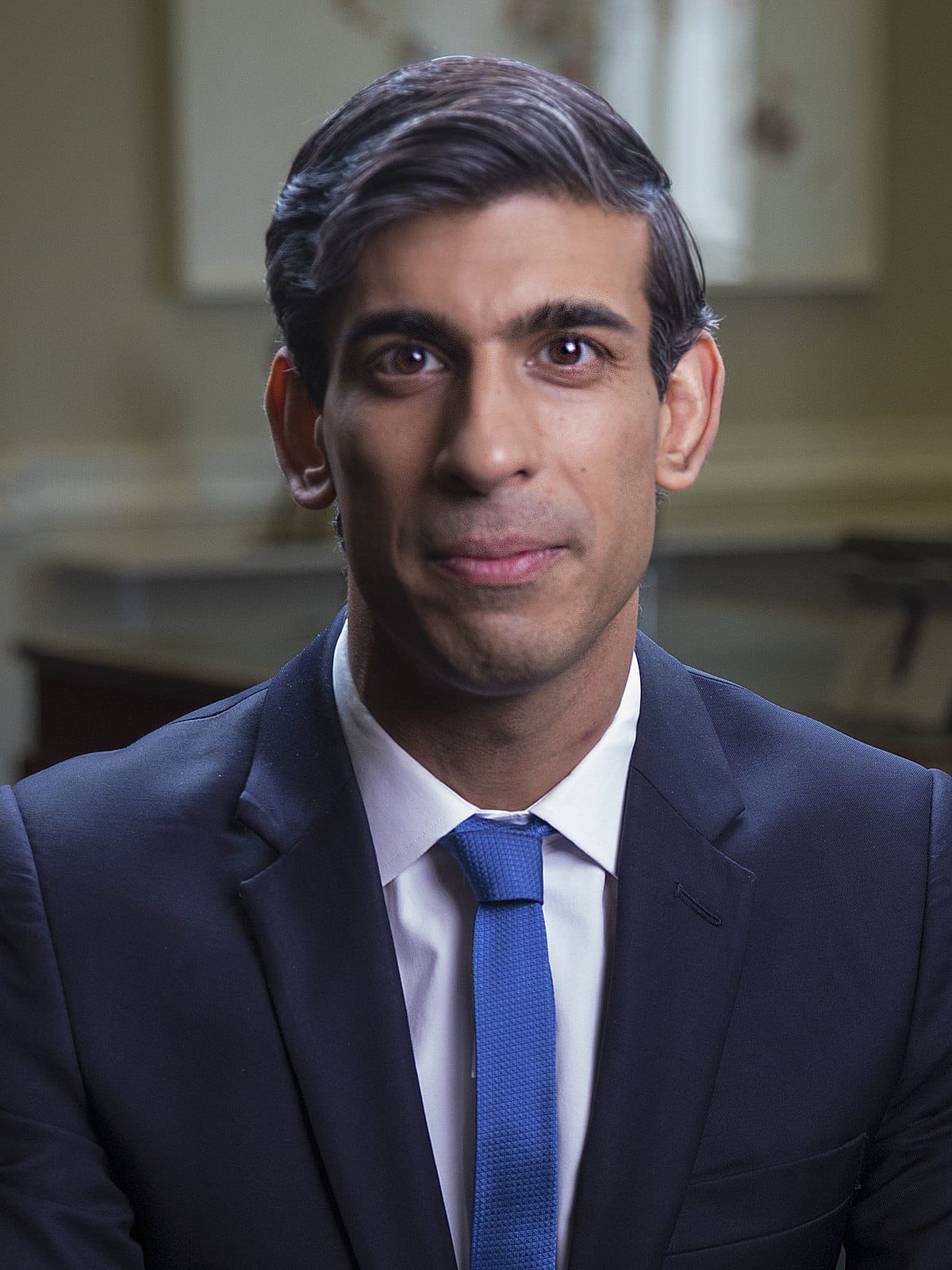
As Chancellor, Sunak was prominent in the government’s economic response to the economic ramifications of the government’s decision to impose a lockdown to deal with the COVID-19 pandemic in the United Kingdom. In April 2022, he became the first Chancellor in British history to have been sanctioned for breaking the law while in office after being issued a fixed penalty notice for breaching COVID-19 regulations during lockdowns. He resigned as Chancellor on 5 July 2022, citing the differences between himself and Boris Johnson in his resignation letter. He is considered a possible candidate to replace Johnson in the upcoming Conservative party leadership election.
|
The Right Honourable
Rishi Sunak Biography
MP
|
|
|---|---|
| Chancellor of the Exchequer | |
| In-office 13 February 2020 – 5 July 2022 |
|
| Prime Minister | Boris Johnson |
| Preceded by | Sajid Javid |
| Succeeded by | Nadhim Zahawi |
| Chief Secretary to the Treasury | |
| In-office 24 July 2019 – 13 February 2020 |
|
| Prime Minister | Boris Johnson |
| Preceded by | Liz Truss |
| Succeeded by | Steve Barclay |
| Parliamentary Under-Secretary of State for Local Government | |
| In-office 9 January 2018 – 24 July 2019 |
|
| Prime Minister | Theresa May |
| Preceded by | Marcus Jones |
| Succeeded by | Luke Hall |
| Member of Parliament for Richmond (Yorks) |
|
|
Incumbent
|
|
| Assumed office 7 May 2015 |
|
| Preceded by | William Hague |
| Majority | 27,210 (47.2%) |
| Personal details | |
| Born | 12 May 1980 Southampton, Hampshire, England |
| Political party | Conservative |
| Spouse(s) |
Akshata Murty (m. 2009)
|
| Children | 2 |
| Relatives |
|
| Education | Lincoln College, Oxford (BA) Stanford University (MBA) |
| Signature |  |
| Website | rishisunak |
Early life and education (Rishi Sunak Biography)
Sunak was born on 12 May 1980 in Southampton to Indian parents Yashvir and Usha Sunak. He is the eldest of three siblings. His father Yashvir was born and raised in the Colony and Protectorate of Kenya (present-day Kenya), while his mother Usha was born in Tanganyika (which later became part of Tanzania). His grandparents were born in Punjab Province, British India, and emigrated from East Africa with their children to the UK in the 1960s. Yashvir was a general practitioner, and Usha was a pharmacist who ran a local pharmacy.
Sunak attended Stroud School in Romsey, Hampshire, and Winchester College, a boys’ independent boarding school, where he was head boy and the editor of the school paper. He waited tables at a curry house in Southampton during his summer holidays. He read philosophy, politics, and economics at Lincoln College, Oxford, graduating with a first in 2001. During his time at university, he undertook an internship at Conservative Campaign Headquarters. In 2006, he gained an MBA from Stanford University, where he was a Fulbright scholar.
Business career (Rishi Sunak Biography)
Sunak worked as an analyst for the investment bank Goldman Sachs between 2001 and 2004. He then worked for the hedge fund management firm The Children’s Investment Fund Management, becoming a partner in September 2006. He left in November 2009 in order to join former colleagues at a new hedge fund firm, Theleme Partners, which launched in October 2010 with $700 million under management. He was also a director of the investment firm Catamaran Ventures, owned by his father-in-law, Indian businessman N. R. Narayana Murthy.
Early political career (Rishi Sunak Biography)
Member of Parliament
Sunak was selected as the Conservative candidate for Richmond (Yorks) in October 2014. The seat had previously been held by William Hague, a former leader of the party, Foreign Secretary, and First Secretary of State, who chose to stand down at the following general election. The seat is one of the safest Conservative seats in the United Kingdom and has been held by the party for over 100 years. In the same year, Sunak was head of the Black and Minority Ethnic (BME) Research Unit of center-right think tank Policy Exchange, for which he co-wrote a report on BME communities in the UK. He was elected as MP for the constituency at the 2015 general election with a majority of 19,550 (36.2%). During the 2015–2017 parliament he was a member of the Environment, Food and Rural Affairs Select Committee.
Sunak supported the UK leaving the European Union in the June 2016 membership referendum. That year, he wrote a report for the Centre for Policy Studies (a Thatcherite think tank) supporting the establishment of free ports after Brexit, and the following year wrote a report advocating the creation of a retail bond market for small and medium-sized enterprises.
Sunak was re-elected at the 2017 general election, with an increased majority of 23,108 (40.5%). He served as Parliamentary Under-Secretary of State for Local Government between January 2018 and July 2019. Sunak voted for then-Prime Minister Theresa May’s Brexit withdrawal agreement on all three occasions and voted against a referendum on any withdrawal agreement. He supported Boris Johnson in the 2019 Conservative Party leadership election and co-wrote an article in The Times newspaper with fellow MPs Robert Jenrick, and Oliver Dowden to advocate for Johnson during the campaign in June.
Chief Secretary to the Treasury
Sunak was appointed as Chief Secretary to the Treasury by Prime Minister Boris Johnson on 24 July 2019, serving under Chancellor Sajid Javid. He became a member of the Privy Council the next day.
He was re-elected in the 2019 general election with an increased majority of 27,210 (47.2%). During the election campaign, Sunak represented the Conservatives in both the BBC’s and ITV’s seven-way election debates.
Chancellor of the Exchequer (2020–2022) (Rishi Sunak Biography)
Appointment
In the weeks leading up to Sunak’s appointment as Chancellor of the Exchequer, a number of briefings in the press had suggested that a new economic ministry led by Sunak might be established, to reduce the power and political influence of Chancellor Sajid Javid at the Treasury. Sunak was considered to be a Johnson loyalist, favored by Dominic Cummings, and seen as the “rising star” minister who had ably represented the Prime Minister during the 2019 election debates. By February 2020, it was reported by The Guardian that Javid would remain in his role as Chancellor and that Sunak would stay on as Chief Secretary to the Treasury, in order for the Prime Minister’s Chief Adviser, Cummings, to “keep an eye” on Javid.
COVID-19 pandemic
Sunak’s first budget took place on 11 March 2020. This included an announcement of £30 billion of additional spending, of which £12 billion was allocated for mitigation of the economic effects of the COVID-19 pandemic.
As the pandemic generated financial consequences, Chancellor Sunak’s measures received criticism as some workers were unable to qualify for the Treasury’s income support measures. The acting leader of the Liberal Democrats, Sir Ed Davey, said that people were being unfairly “hung out to dry”, with “their dream jobs turning into nightmares” after hundreds of MPs contacted the Chancellor. The Institute for Employment Studies estimated that 100,000 people could not be eligible for any type of government help as they started a new job too late to be included in the job retention scheme, while the British Hospitality Association informed the Treasury Select Committee that between 350,000 and 500,000 workers in its sector were not eligible.
Sunak was part of a committee of Cabinet ministers (also comprising Johnson, Matt Hancock, and Michael Gove) that made decisions on the pandemic.
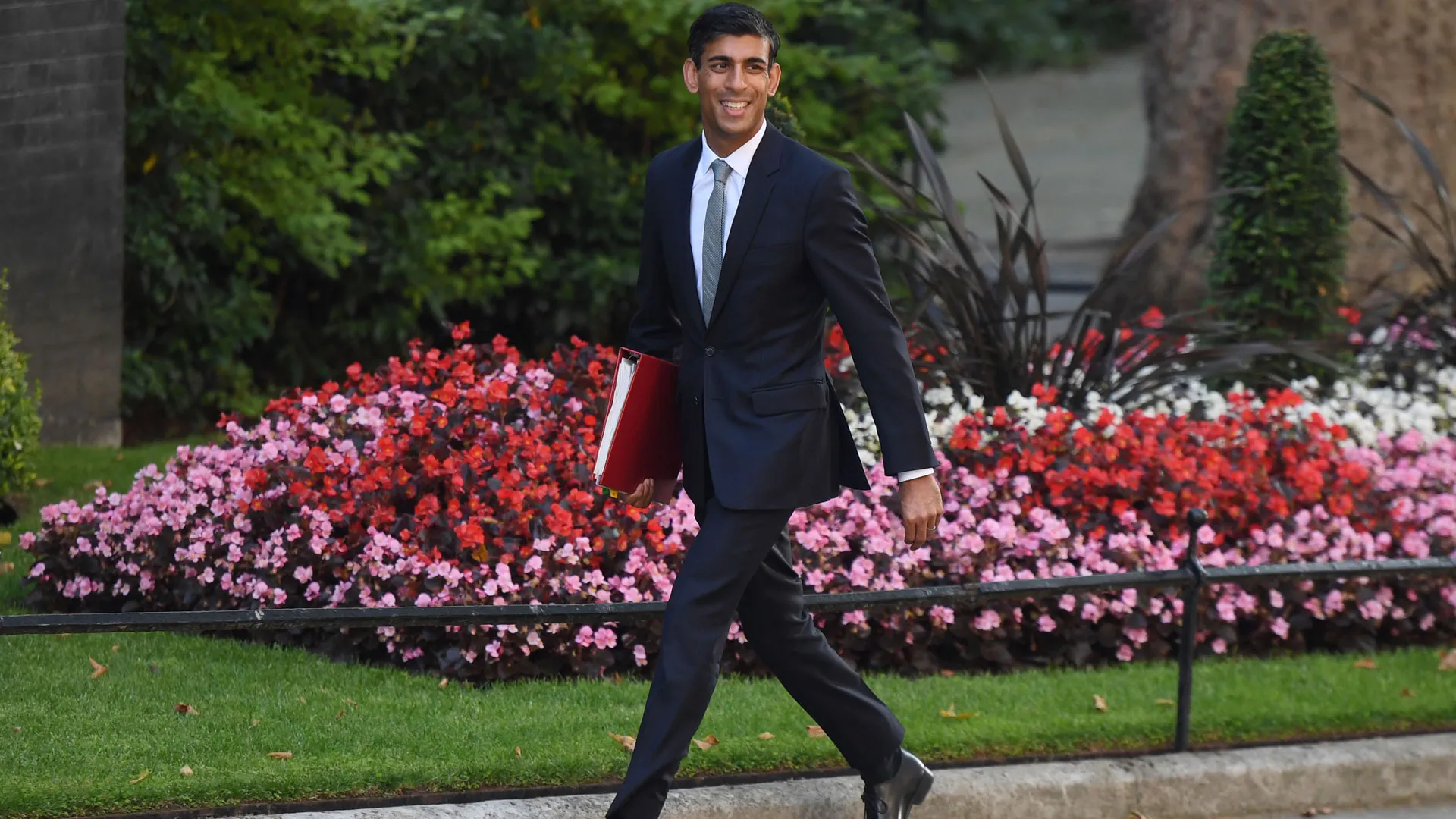
Job retention scheme
On 17 March, Sunak announced £330 billion in emergency support for businesses, as well as a furlough scheme for employees. This was the first time a British government had created such an employee retention scheme. The scheme was announced on 20 March 2020 as providing grants to employers to pay 80% of a staff wage and employment costs each month, up to a total of £2,500 per person per month. The cost has been estimated at £14 billion a month to run.
Eat Out to Help Out
In July, he unveiled a plan for a further £30 billion of spending which included a stamp duty holiday, a cut to value-added tax (VAT) for the hospitality sector, the Eat Out to Help Out scheme, and job retention bonus for employers. Eat Out to Help Out was announced to support and create jobs in the hospitality industry. The government-subsidized food and soft drinks at 50%, up to £10 per person at participating cafes, pubs, and restaurants. The offer was available from 3 to 31 August on Monday to Wednesday each week. In total, the scheme subsidized £849 million in meals. Some consider the scheme to be a success in boosting the hospitality industry, however, others disagree. In terms of the COVID-19 pandemic, a study at the University of Warwick found that the scheme contributed to a rise in COVID-19 infections of between 8% and 17%.
In an Ipsos MORI poll in September 2020, Sunak had the highest satisfaction score of any British Chancellor since Labour’s Denis Healey in April 1978.
March 2021 budget
In his March 2021 budget, he announced that the deficit had risen to £355 billion in the fiscal year 2020/2021, the highest in peacetime. The budget included an increase in the rate of corporation tax from 19% to 25% in 2023, a five-year freeze in the tax-free personal allowance and the higher rate income tax threshold, and the extension of the furlough scheme until the end of September. Sunak was the first Chancellor to raise the corporation tax rate since Healey in 1974.
Fixed penalty notice
On 12 April 2022, Sunak was issued a fixed penalty notice for breaching COVID-19 regulations during lockdowns. A number of others also received fixed penalty notices including Johnson. Sunak become the first Chancellor in British history to have been found to have broken the law while in office. Keir Starmer has called on Johnson and Sunak to resign.
Register of ministers’ interests
In November 2020, Sunak was reported by The Guardian to have not declared a significant amount of his wife and family’s financial interests on the register of ministers’ interests, including a combined £1.7 billion shareholding in the Indian company Infosys. Sunak is required under the ministerial code to declare interests that are “relevant” to his responsibilities and “which might be thought to give rise to a conflict” with his public duties. A Treasury spokesperson said that Sunak “followed the ministerial code to the letter in his declaration of interests”. The Labour MP Tonia Antoniazzi wrote to Lord Evans, chair of the Committee on Standards in Public Life, to assess whether the ministerial code was breached by Sunak.
G7 tax reform
In June 2021, at the G7 summit hosted by Sunak at Lancaster House in London, a tax reform agreement was signed, which in principle, sought to establish a global minimum tax on multinationals and online technology companies. In October 2021, the OECD signed an accord to join the tax reform plan.
Cost of living crisis
In October 2021, Sunak made his third budget statement. It included substantial spending promises to a large extent related to science and education.
Sunak made his spring statement on 23 March 2022. He said that the recovery from the COVID-19 pandemic had been disrupted by the Russian invasion of Ukraine. He cut fuel duty, removed VAT on energy-saving equipment (such as solar panels and insulation), and reduced national insurance payments for small businesses while continuing with a planned national insurance rise in April he promised to align the primary threshold with the basic personal income allowance as of July. He also promises a reduction in income tax in 2024. The Office for Budget Responsibility said that the tax burden would reach its highest level since the 1940s. Sunak also provided some funding to help vulnerable people cope with the rising cost of living, however, most political commentators and consumer groups considered the response insufficient.
Non-domiciled status of his wife
Sunak’s wife, Akshata Murty, has non-domiciled status, which means she does not have to pay tax on income earned abroad while living in the UK. She pays around £30,000 to secure the status, which allows her to avoid paying an estimated £20 million in UK taxes. Following media controversy, Murty announced on 8 April that she would pay UK taxes on her global income, adding in a statement that she didn’t want the issue “to be a distraction for my husband”. On 10 April it was announced that a Whitehall inquiry had been launched into who had leaked the details of her tax status. On 11 April 2022, The Guardian wrote, “Keir Starmer has accused Rishi Sunak of taxation “hypocrisy” on the grounds that he is putting up taxes for ordinary Britons while his family has been reducing its own tax liabilities.”
Resignation
On 5 July 2022, Sunak resigned as chancellor moments after Sajid Javid resigned as health secretary amid a controversy surrounding the sexual harassment allegations against Chris Pincher MP. In his resignation letter, Sunak said, “… the public rightly expect the government to be conducted properly, competently and seriously. I recognize this may be my last ministerial job, but I believe these standards are worth fighting for and that is why I am resigning… In preparation for our proposed joint speech on the economy next week, it has become clear to me that our approaches are fundamentally too different.” Nadhim Zahawi was announced as Sunak’s successor.
Public image (Rishi Sunak Biography)
At the start of 2020, following his appointment as Chancellor of the Exchequer, Sunak arrived in public discourse from relative obscurity. In the early stages of the COVID-19 pandemic, he was very popular by the standards of British politics, being described by one analyst as having “better ratings than any politician since the heydays of Tony Blair”. Various polling suggested he maintained this position throughout 2020. Sunak developed something of a cult media following with jokes and gossip about him being sexually attractive becoming widespread on social media and in magazines.
Public attitudes towards Sunak remained broadly positive in 2021, though his popularity declined steadily over time. By early 2022, with the cost of living becoming a growing focus of public concern, Sunak’s response, as the Chancellor of the Exchequer, was perceived to be inadequate and he received some of his lowest ever approval ratings. This fall continued as the Sunak family’s financial affairs came under scrutiny.
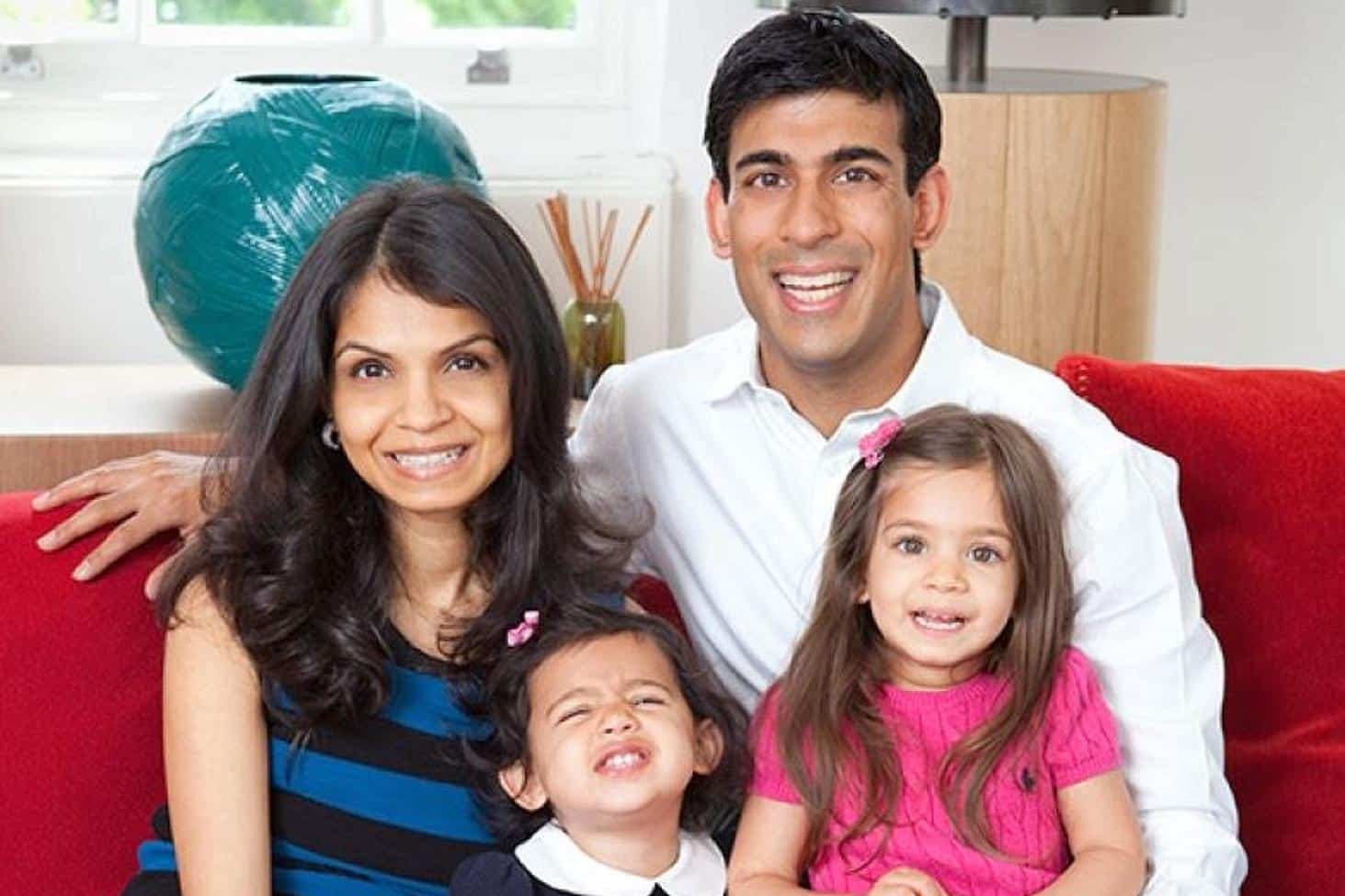
Personal life (Rishi Sunak Biography)
Sunak married Akshata Murty, the daughter of the Indian billionaire N. R. Narayana Murthy, the founder of Infosys, in August 2009. Akshata Murty owns a 0.91% stake in Infosys, which is valued at about $900m (£690m), as of April 2022. Infosys continued to operate in Russia following Russia’s 2022 invasion of Ukraine, which led to criticism of Sunak and his family, but in April Infosys announced it was closing its Russian office. Akshata also owns shares in two of Jamie Oliver’s restaurant businesses, Wendy’s in India, Koro Kids (nanny agency), and Digme Fitness (gym operator).
Akshata and Sunak met while studying at Stanford University; they have two daughters. Akshata is a director of her father’s investment firm, Catamaran Ventures, and also manages her own fashion label. They live at Kirby Sigston Manor in Kirby Sigston village near Northallerton, North Yorkshire. They also own a house in Kensington in central London, a flat on Old Brompton Road, London, and a penthouse apartment in Santa Monica, California.
Sunak is a Hindu and has taken his oath at the House of Commons on the Bhagavad Gita since 2017. He is a teetotaller. He was previously a governor of the East London Science School. Sunak has a Labrador called Nova.
Sunak’s brother Sanjay is a psychologist with five degrees. His sister Raakhi works as the Head of Humanitarian, Peacebuilding, UN Funds & Programmes at the Foreign, Commonwealth, and Development Office. He is close friends with The Spectator‘s political editor James Forsyth, whom he has known since their schooldays at Winchester College. Sunak was the best man at Forsyth’s wedding to the journalist Allegra Stratton, and they are godparents to each other’s children.
In April 2022, it was reported that Sunak and his wife had moved out of Downing Street to a newly-refurbished, luxury West London home.
In the Sunday Times Rich List 2022 ranking of the wealthiest people in the UK, he was placed 222nd with an estimated fortune jointly with his wife of £730million, making him the “first frontline politician to join the rich list”.


